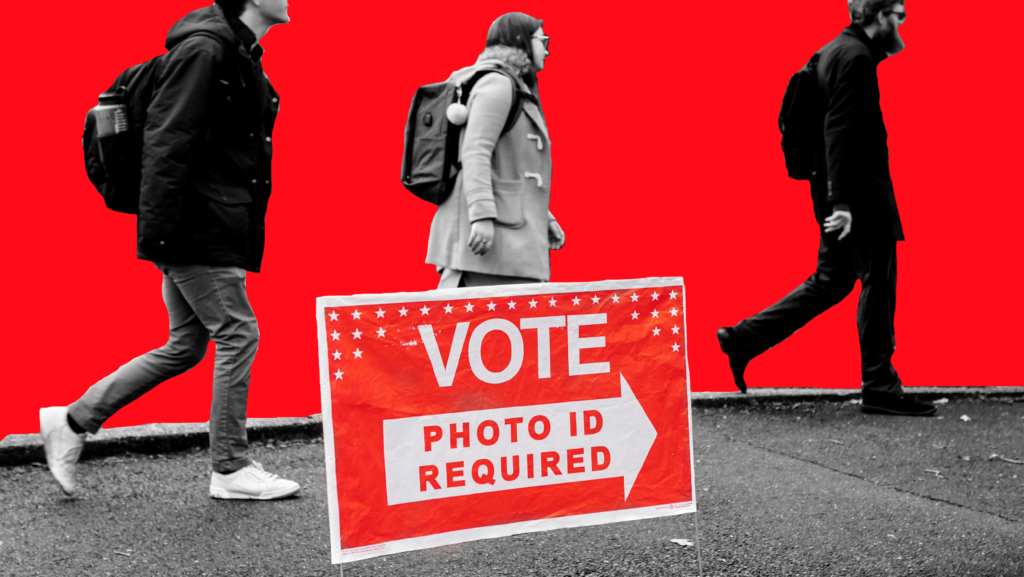New Hampshire Is Ground Zero for Student Voting Rights

In 49 states and the District of Columbia, the rules are clear: if you live in a state while attending school there, you can register to vote in that state. In 1979, the U.S. Supreme Court affirmed in Symm v. U.S. that college students could register to vote where they go to school. In most places, it’s a no brainer. Not so much in New Hampshire.
In the Granite State, Republicans have instead decided to become professional student vote suppressors. It’s nothing new — New Hampshire has a history of voter suppression. New Hampshire was one of the few states outside the Deep South subject to “preclearance” from the federal government to any changes in voting laws because of discriminatory behavior in the 1960s. During the 2016 election, Republican Gov. Chris Sununu falsely claimed Democrats were busing voters in from Massachusetts and elsewhere, earning him a “Pants-on-Fire” PolitiFact rating. Trump henchman Stephen Miller and even the Suppressor-in-Chief himself quickly picked up the script from Gov. Sununu, telling reporters that there were “thousands and thousands of people coming in [to vote in New Hampshire] from locations unknown.”
When the GOP took control of New Hampshire’s government in 2017, one of its first acts was to start suppressing the votes of New Hampshire college students outright. The calculus was clear: measured against its overall population, New Hampshire has a higher percentage of college students than any other state and nearly 70% of these students move to New Hampshire for school. Republicans determined that they’d rather restrict these students’ access to the ballot than compete for their votes. 2017’s Senate Bill 3 said that in order to register, students needed to “provide documents that ‘demonstrate an intent to make a place [their] domicile’” indefinitely—something no other state does. After years of wrangling, that bill got struck down in April 2020, with Hillsborough Superior Court Judge David Anderson writing a 50-page decision excoriating state Republicans, including this pointed observation: “SB 3 does not stop someone at the polls from casting a ballot; it discourages them from showing up in the first place.”
The details have changed, but the intent stays the same: Republicans simply cannot win federal office in New Hampshire without cheating.
In 2018, the New Hampshire GOP introduced a new slew of bills to suppress the student vote. After one package was introduced, Sununu promised young activists that he “hated” the proposed changes to the law and that he would “never support anything that suppresses the student vote.” Months later, he signed one of those suppressive bills.
November’s elections handed New Hampshire Republicans a legislative trifecta in Concord again, which means the vote suppressors are back at it. By our count, one in eight of all bills introduced thus far in the state legislature pertain to voting rights.
The suppressors’ most egregious effort this cycle is House Bill 429, sponsored by State Representative Al Baldasaro, who once called for Hillary Clinton to be shot by firing squad. In addition to prohibiting college IDs from serving as forms of voter ID (a favorite tactic of the GOP in Texas, Georgia and elsewhere), Baldasaro’s H.B. 429 attempts to give in-state tuition to all students who register to vote in New Hampshire. It’s a new and underhanded suppression tactic, one that would pit colleges and universities against students who relocate to New Hampshire to go to school. If the bill passes, it’s a slippery slope that may even incentivize schools to discourage their students from registering to vote.
Other bills would outright remove college addresses as acceptable voter registration addresses (which would overturn 50 years of precedent in the state) and declare that someone who could register to vote in a different state (say, a New Hampshire-born Marine stationed temporarily in California) couldn’t register in New Hampshire.
The details have changed, but the intent stays the same: Republicans simply cannot win federal office in New Hampshire without cheating.
Republicans haven’t won a U.S. Senate race in New Hampshire in 11 years, nor a congressional seat since 2014. Now they’re chest-thumping about plans to gerrymander Rep. Chris Pappas out of office while suppressing the students who are a critical part of Sen. Maggie Hassan’s potential winning coalition in 2022. They’ve turned the small blaze of voter fraud lies five years ago into a massive wildfire of legislation designed to discriminate against young voters. Gov. Sununu is rumored to be considering a run against Sen. Hassan, and he’s proven he’ll do whatever it takes to win, including rigging our democracy in his favor.
For now, we will have to mobilize to kill these bills and litigate to overturn them if they’re passed. You can join NextGen America’s organizing efforts here. But what’s happening in New Hampshire is symptomatic of a larger GOP problem. Republican elected officials in Arizona, Pennsylvania, Georgia and elsewhere are following this “cheat-to-win” strategy, putting young Americans’ votes — and their faith in government — at risk.
As always, however, the best defense is a good offense — and Democrats in Washington have a chance to fight back by passing sweeping voting rights and democracy reform bills. H.R. 1 (the “For the People Act”) and H.R. 4 (the “John Lewis Voting Rights Act”) would help do away with this anti-student chicanery once and for all. Democrats owe their Senate majority to Sen. Hassan’s 1,017-vote victory in 2016. Suppressing the student vote in New Hampshire has grave implications for us all. The fight for the U.S. Senate starts in Concord.
Ben Wessel is the Executive Director of NextGen America, the nation’s largest youth vote campaign.